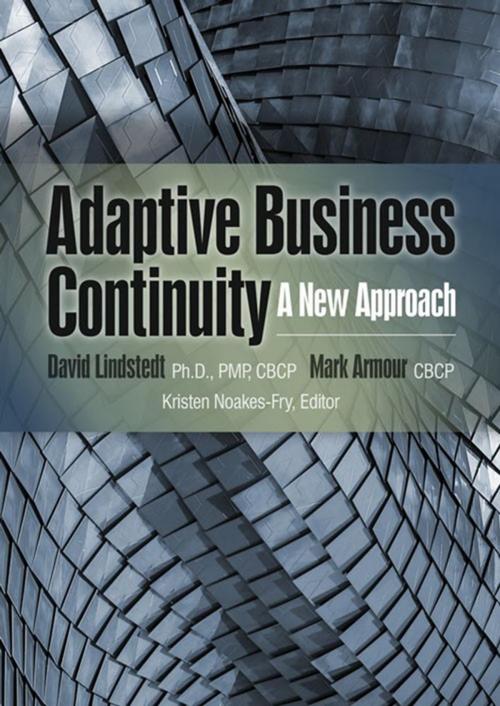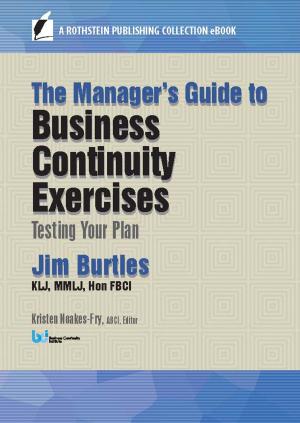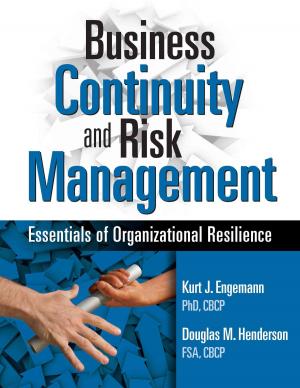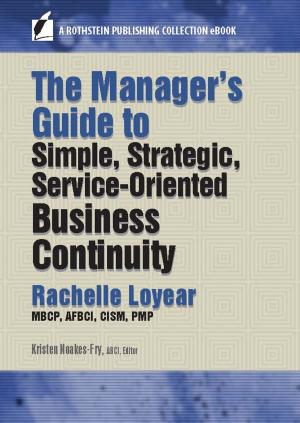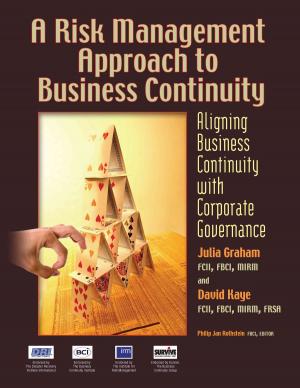Adaptive Business Continuity: A New Approach
Business & Finance, Industries & Professions, Insurance, Management & Leadership, Management| Author: | David Lindstedt, Mark Armout | ISBN: | 9781944480400 |
| Publisher: | Rothstein Publishing | Publication: | June 5, 2017 |
| Imprint: | Rothstein Publishing | Language: | English |
| Author: | David Lindstedt, Mark Armout |
| ISBN: | 9781944480400 |
| Publisher: | Rothstein Publishing |
| Publication: | June 5, 2017 |
| Imprint: | Rothstein Publishing |
| Language: | English |
Have you begun to question traditional best practices in business continuity (BC)? Do you seem to be concentrating on documentation rather than preparedness? Compliance rather than recoverability? Do your efforts provide true business value? If you have these concerns, David Lindstedt and Mark Armour offer a solution in Adaptive Business Continuity: A New Approach. This ground-breaking new book provides a streamlined, realistic methodology to change BC dramatically.
After years of working with the traditional practices of business continuity (BC) – in project management, higher education, contingency planning, and disaster recovery – David Lindstedt and Mark Armour identified unworkable areas in many core practices of traditional BC. To address these issues, they created nine Adaptive BC principles, the foundation of this book:
- Deliver continuous value.
- Document only for mnemonics.
- Engage at many levels within the organization.
- Exercise for improvement, not for testing.
- Learn the business.
- Measure and benchmark.
- Obtain incremental direction from leadership.
- Omit the risk assessment and business impact analysis.
- Prepare for effects, not causes.
Adaptive Business Continuity: A New Approach uses the analogy of rebuilding a house. After the initial design, the first step is to identify and remove all the things not needed in the new house. Thus, the first chapter is “Demolition” – not to get rid of the entire BC enterprise, but to remove certain BC activities and products to provide the space to install something new. The stages continue through foundation, framework, and finishing. Finally, the last chapter is “Dwelling,” permitting you a glimpse of what it might be like to live in this new home that has been created.
Through a wealth of examples, diagrams, and real-world case studies, Lindstedt and Armour show you how you can execute the Adaptive BC framework in your own organization. You will:
- Recognize specific practices in traditional BC that may be problematic, outdated, or ineffective.
- Identify specific activities that you may wish to eliminate from your practice.
- Learn the capability and constraint model of recoverability.
- Understand how Adaptive BC can be effective in organizations with vastly different cultures and program maturity levels.
- See how to take the steps to implement Adaptive BC in your own organization.
- Think through some typical challenges and opportunities that may arise as you implement an Adaptive BC approach.
Have you begun to question traditional best practices in business continuity (BC)? Do you seem to be concentrating on documentation rather than preparedness? Compliance rather than recoverability? Do your efforts provide true business value? If you have these concerns, David Lindstedt and Mark Armour offer a solution in Adaptive Business Continuity: A New Approach. This ground-breaking new book provides a streamlined, realistic methodology to change BC dramatically.
After years of working with the traditional practices of business continuity (BC) – in project management, higher education, contingency planning, and disaster recovery – David Lindstedt and Mark Armour identified unworkable areas in many core practices of traditional BC. To address these issues, they created nine Adaptive BC principles, the foundation of this book:
- Deliver continuous value.
- Document only for mnemonics.
- Engage at many levels within the organization.
- Exercise for improvement, not for testing.
- Learn the business.
- Measure and benchmark.
- Obtain incremental direction from leadership.
- Omit the risk assessment and business impact analysis.
- Prepare for effects, not causes.
Adaptive Business Continuity: A New Approach uses the analogy of rebuilding a house. After the initial design, the first step is to identify and remove all the things not needed in the new house. Thus, the first chapter is “Demolition” – not to get rid of the entire BC enterprise, but to remove certain BC activities and products to provide the space to install something new. The stages continue through foundation, framework, and finishing. Finally, the last chapter is “Dwelling,” permitting you a glimpse of what it might be like to live in this new home that has been created.
Through a wealth of examples, diagrams, and real-world case studies, Lindstedt and Armour show you how you can execute the Adaptive BC framework in your own organization. You will:
- Recognize specific practices in traditional BC that may be problematic, outdated, or ineffective.
- Identify specific activities that you may wish to eliminate from your practice.
- Learn the capability and constraint model of recoverability.
- Understand how Adaptive BC can be effective in organizations with vastly different cultures and program maturity levels.
- See how to take the steps to implement Adaptive BC in your own organization.
- Think through some typical challenges and opportunities that may arise as you implement an Adaptive BC approach.
